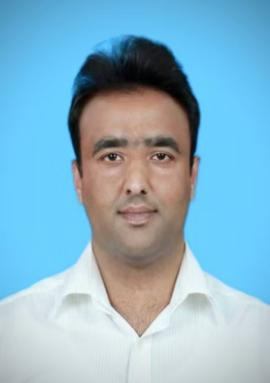留学生SAYED MURAD ALI SHAH为2021级博士生,今年3月顺利毕业,完成了他的博士学位。他的奉献精神、毅力和对研究的热情为所有留学生树立了杰出的榜样。让我们来看看他在西北工业大学的学习经历和毕业感言吧。
Sayed Murad Ali Shah, a brilliant scholar from the 2021 batch, has achieved an exceptional academic milestone by completing his PhD, graduating in March 2025. His dedication, perseverance, and passion for research have set a remarkable example for aspiring scholars.
Join us as we delve into his learning experience and relive the highlights of his heartfelt graduation speech - a testament to hard work, mentorship, and the pursuit of excellence.
1. Personal Introduction

My name is Sayed Murad Ali Shah, I am originally from Khyber Pakhtunkhwa, Pakistan. I recently completed my PhD at Northwestern Polytechnical University, School of Mathematics and Statistics, specializing in stochastic differential equations (SDEs). My research focuses on stochastic modeling of Hepatitis B virus (HBV) dynamics, aiming to enhance our understanding and predict disease spread under uncertainty.
This journey from Pakistan to China has given me a unique global perspective, allowing me to integrate diverse cultural insights with academic rigor. I firmly believe that scientific collaboration across borders is key to addressing complex public health challenges and driving meaningful advancements in mathematical epidemiology.
2. Academic Achievements
Throughout my academic career, I have been fortunate to contribute to impactful research. I have authored 7 articles in reputable journals, published during my PhD. My dedication to understanding complex systems has been recognized through prestigious awards, including the Academic Star Award (2023–2024) and the Best Poster Award at the Belt and Road Academic Forum. I am also proud to be the first PhD graduate from the 2021 batch at Northwestern Polytechnical University. These achievements continue to inspire me to strive for excellence and drive meaningful contributions to my field.
3. Research Focus
My research lies at the intersection of mathematical analysis, stochastic modeling, and mathematical epidemiology, where I develop rigorous models to capture the complex, unpredictable nature of infectious disease dynamics. I specialize in stochastic differential equations (SDEs) and jump-diffusion theory, incorporating both white noise (representing continuous, small-scale fluctuations) and Lévy noise (accounting for rare, large-scale disruptions) to enhance the realism of epidemic models. My work focuses on Hepatitis B virus (HBV) transmission, integrating critical epidemiological factors such as vaccination, media influence, and optimal control strategies to identify the most effective intervention approaches. Additionally, I extend my research to co-infection dynamics, particularly HBV-TB interactions, providing deeper insights into how multiple infections shape disease progression. Through advanced mathematical techniques and extensive numerical simulations, my research not only enhances our theoretical understanding of epidemic systems but also delivers actionable strategies to strengthen public health responses in regions facing high disease burdens and healthcare constraints.
4. Resilience in Research and Growth
The path to academic success is rarely straightforward, and my journey has been one of perseverance, adaptability, and continuous growth. Moving to a new country and immersing myself in advanced research demanded not only technical expertise but also the resilience to navigate unfamiliar environments and master complex methodologies. Through specialized training in presentation, leadership, and evaluation, I have honed both my analytical and communication skills, enabling me to convey intricate mathematical concepts with clarity and impact. These experiences have reinforced my ability to tackle challenging research problems, think critically under uncertainty, and remain steadfast in the pursuit of meaningful scientific contributions. They have also deepened my commitment to leveraging stochastic modeling and mathematical epidemiology to address pressing public health challenges, demonstrating that adaptability and perseverance are just as vital as technical proficiency in driving innovation and creating lasting change.
5. Future Aspirations
Looking ahead, my goal is to continue making meaningful contributions to the scientific community, whether by joining a leading Chinese university as an academic researcher or by returning to Pakistan to advance research and education in my home country. My ambition is to drive impactful research in stochastic modeling and mathematical epidemiology, addressing critical public health challenges through innovative mathematical approaches. Beyond research, I am committed to mentoring and inspiring future generations, fostering a culture of scientific inquiry and problem-solving. Regardless of the path I take, my dedication to using science as a catalyst for positive change remains steadfast, with the ultimate aim of shaping policies, improving healthcare strategies, and contributing to the global fight against infectious diseases.
6. Mentor’s Perspective
My PhD supervisor, Professor Yufeng Nie, has been a guiding force in my academic journey, recognizing my research for its rigor, originality, and depth. Under his mentorship, I have developed strong analytical skills and a keen problem-solving approach, which have been reflected in my impactful publications and successful PhD defense. He has consistently encouraged me to push the boundaries of stochastic modeling and mathematical epidemiology, emphasizing the importance of precision, innovation, and collaboration in research. His support has reinforced my belief that scientific progress is driven by dedication, intellectual curiosity, and the collective pursuit of knowledge principles that continue to shape my academic and professional aspirations.
撰稿:SAYED MURAD ALI SHAH
编辑:杜莉
审核:李自伟